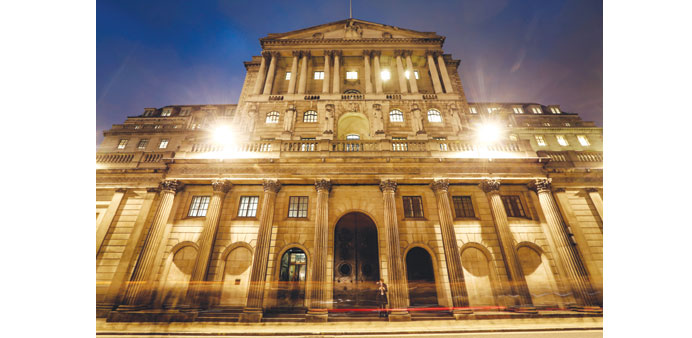The main entrance to the Bank of England at dusk in London. While the BoE has previously said it expected growth in the third quarter to hit 0.6%, it grew 0.4%, matching its lowest rate since late 2012.
Reuters
London
Britain’s economic growth has slowed markedly, according to data yesterday that supports expectations the Bank of England will not raise record low interest rates any time soon.
Hurt by slow demand for exports from a flagging global economy, gross domestic product grew 0.4% in the third quarter, matching its lowest rate since late 2012, when Britain was still struggling to recover from the financial crisis.
The quarterly growth rate undercut all forecasts in a Reuters poll of economists and was down from a previous estimate of 0.5%.
There was a sharper cut for growth in the second quarter, meaning the economy looks set to grow by 2.2% in 2015 as a whole, down from nearly 3% last year, economists said.
“There will be even less near-term pressure to raise interest rates,” Philip Shaw, at Investec, said.
He said his forecast that the Bank would make its long-awaited tightening move around May was looking at risk.
Until a couple of months ago, the BoE was expected to raise rates quite soon after the US Federal Reserve, which last week increased borrowing costs for the first time in nearly a decade. But that was before wage growth slowed in Britain and yesterday’s unexpected growth downgrade.
Shaw said Britain’s economy still looked likely to perform well in 2016.
“We remain of the view that the expansion is not losing significant traction and that solid growth of around 2.5% will be achieved,” he said.
The BoE has previously said it expected growth in the third quarter to hit 0.6%.
In annual terms, overall economic growth in the third quarter was revised down to 2.1% from a previous reading of 2.3%, the slowest pace in two years.
Weaker growth in Britain’s huge services sector, especially financial services, was behind the lower growth between July and September, the Office for National Statistics (ONS) said.
Britain has outpaced most other developed economies over the past two years, helping Prime Minister David Cameron to lead his Conservative Party to an election victory in May.
A spokesman for the finance ministry said yesterday’s data highlighted the risks, among them weaker growth in the world economy.
Another is home-grown. Economists said Britain’s referendum on its membership of the European Union could weigh on growth in 2016 when the vote is likely to take place.
Britain’s recovery since 2013 has been driven in large part by spending by consumers. Yesterday’s data showed household spending rose more quickly than previously thought in the third quarter, helped by the biggest annual increase in disposable income since 2010 as inflation tumbled to zero and wages rose.
Still, the savings ratio fell to its joint lowest level since 1963, suggesting consumers might not be able to keep up their recent levels of spending.
Other ONS figures suggested BoE governor Mark Carney will not be worried about inflation pressures.
Growth in unit labour costs, including wages and other employment-related costs, slowed to an annual 2.0% from 2.2% in the second quarter.
Carney has said he wants to see unit labour costs picking up, among other factors, before thinking about raising rates.
Furthermore, a measure of growth in the services sector slowed sharply in October, the start of the fourth quarter.
In more encouraging news for the government, the current account deficit, considered one of the weak points of Britain’s economic recovery, was almost stable in the July-September period at 3.7% of gross domestic product, despite forecasts by economists in the Reuters poll that it would widen.

